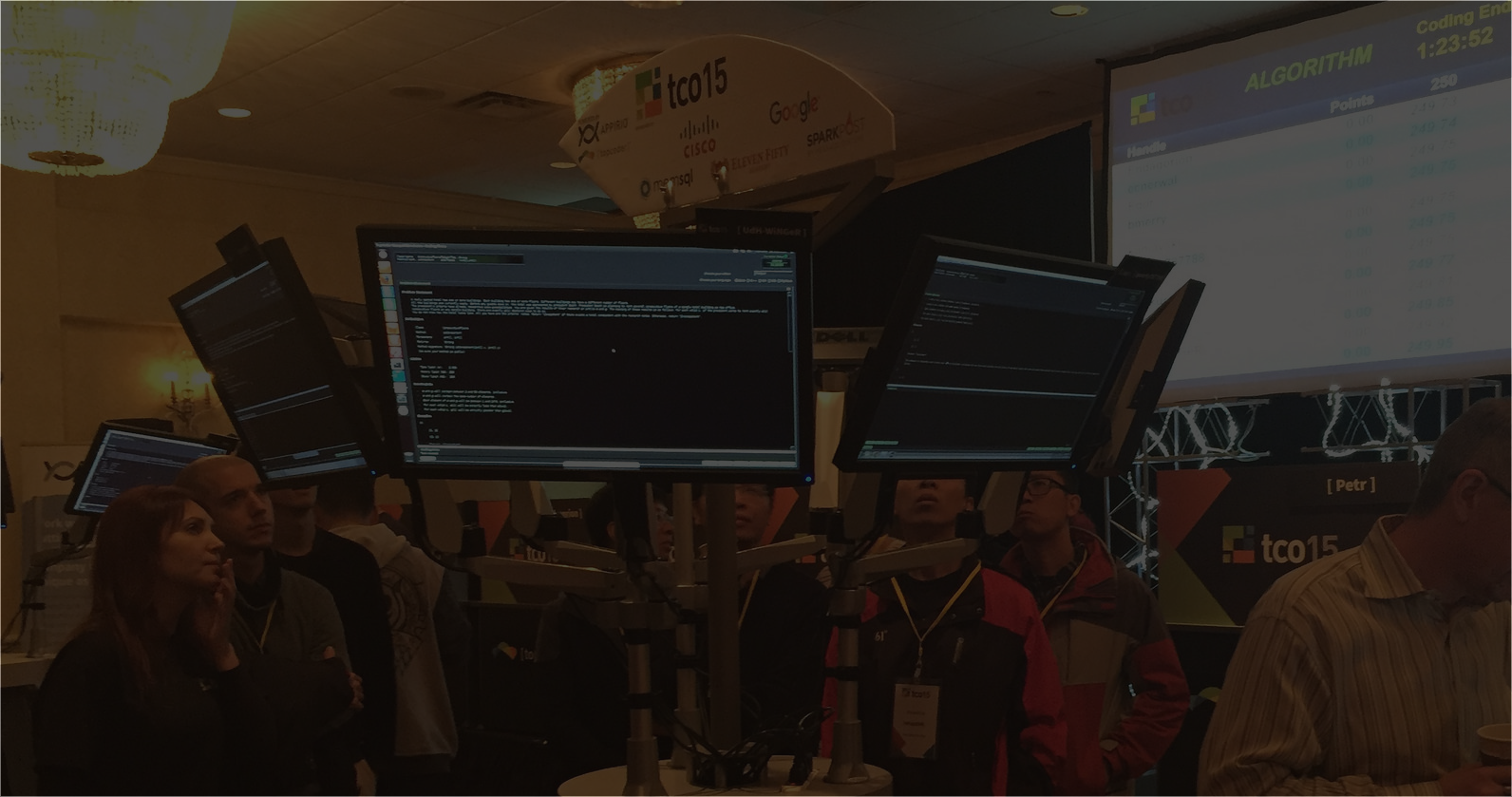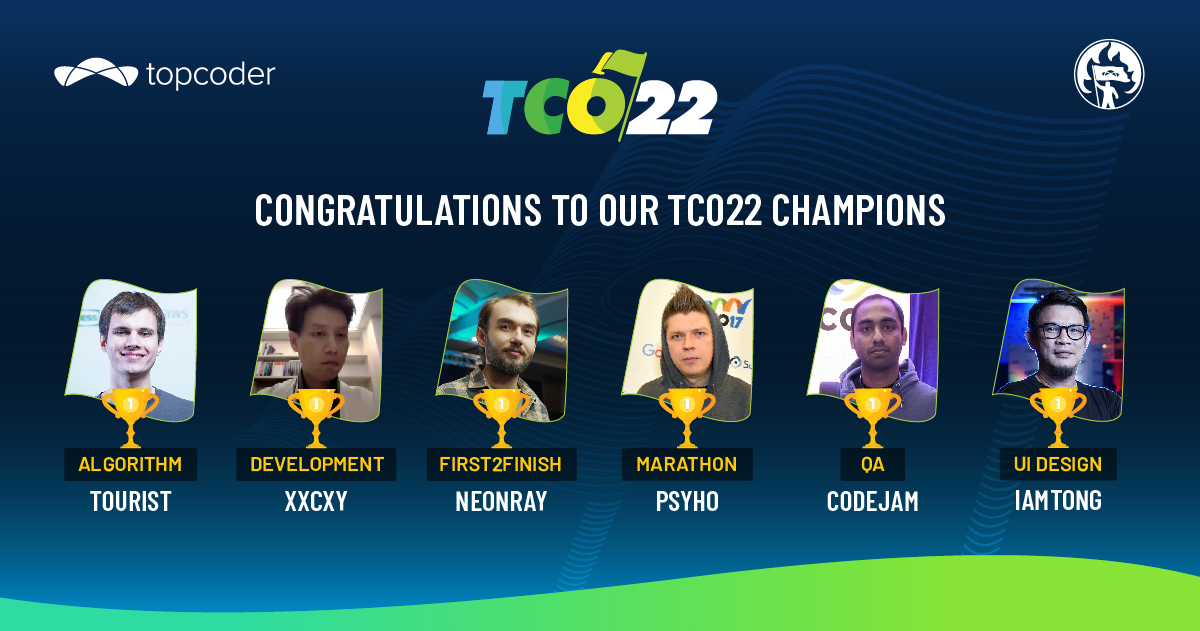November 6, 2018 The Experience of TCO Design Finals
TCO18 is happening next week! The best Topcoder competitors all around the world are going to race against each other to become the champion. For design track we will have 4 rounds: 2 semifinals and 2 finals. You can see the exact schedule here.
Congratulations to our 14 design finalists who made it this year: abedavera, aveef, djackmania, iaminfinite, iamtong, khanhlinh, khusnunirawan, PereViki, Ravijune, riopurba, ssp555, universe, yiming, yoki. Among them we have a couple who are first time finalists and we all know that the onsite competition is different than the online competition, mostly because of the time pressure, so we wanted to see how our best designers approach the problems.
1. When was the first TCO you attended and how was it?
abedavera: TCO 2008 in Las Vegas. It was very memorable for me, I met top designers in Topcoder from other countries. The competition was very fun, I competed with djackmania, oninkxronda, mahestro and others. And the champion was oninkxronda.
iamtong: TCO11, I was so nervous and excited at the same time.
yoki: 2012 was my first TCO, it was one of the best TCO memories I ever had since I got 2nd placement in my very first TCO.
Ravijune: My first TCO was back in 2015 when the Design finals happened in Indonesia. It was really amazing to meet the members in real life. That’s when I truly realized that I made one of my life’s best decisions to join this community, making some life-time friends. Also, you get to learn so much in those few hours of competition. You see how each designer is approaching the problem, can discuss it with them live, and see their hand drawn sketches when they compete.
universo: Last year actually, in 2017. That gave me kind of mixed feelings and excitement.
yiming: It was the TCO 2007 in Las Vegas. It has been one of my best memories.
chekspir: My first TCO ever was TCO15 at Yogyakarta Indonesia. It was a really amazing experience, first because the problem we solved onsite was really interesting, it still it is one of the most interesting challenges I have ever competed. Second, because of all the new good friends I made. Today we are like family thanks to that TCO.
2. What are the main differences when competing onsite versus online and how do you handle the onsite competition?
abedavera: The spirit of onsite competition is very different; I was very nervous at first but became more passionate when I understood the challenge. Understanding the challenge is the key to getting more ideas to solve it, and giving more to the challenge.
iamtong: Onsite is full of pressure from the time and environment, you need to act fast on planning/ thinking and designing.
yoki: Onsite competition is totally different. The adrenaline, deadline, audience, sometimes will get in you – you will feel the pressure. I just try to focus and understand the spec as soon as possible so I can complete my work each round.
Ravijune: I think the only main constraint while competing onsite is time. As long as you focus well and don’t get distracted by the noise you won’t have to worry, and it almost feels same either way, competing onsite or online. But the positive thing about competing onsite is that you get to discuss with the other designers soon after the competition. See how they approach the solution, it’s fun!
universo: You have more limited time onsite rather than online. Time management is the key to success in this case.
yiming: The total time of onsite competition will be much shorter than online. And we have to overcome the jet lag and noisy environment in the onsite competition.
chekspir: The main difference is off course deadline. Working on only 3 hours is really stressful, at least for me. It always takes me like 15 mins just to focus on what I need to do. It’s like “Ok Alex, calm down, you can do this!“. But once I start I cannot stop. The key is to understand the problem, that’s it. Then put in practice all the knowledge you have in you, trust your skills, and you will be to go.
3. How much time of the 3 hours do you use on planning versus designing?
abedavera: 30 min to read details twice, 30 min to sketch ideas and extras, 2hrs to push on design.
iamtong: Depends on the problem, but I think I limit the planning/thinking process to 1 hour maximum.
yoki: I am used to planning while designing :)) While reading the spec I try to imagine and visualise the solution.
Ravijune: So understanding the problem totally depends on how easy/complex it is. But mostly the planning/wireframing on paper takes more time than actually working on the computer. So improving your skills to work faster on whatever software you are good at is crucial.
universo: 2 hours for planning & the rest for designing.
yiming: 0.5 hours to plan and 2.5 hours to design.
chekspir: Well, on the first round it takes me around 25 min just to understand the problem, make questions, pick branding, etc. For the second and third rounds, it is better because we can always do better research and planning in the hotel, so when we start those rounds all ideas are more clear.
4. Do you think the software in which you design makes a big difference?
abedavera: Yes, since we can use XD, Ps or Sketch it makes big difference also with the shortcuts.
iamtong: Yes, earlier I used PS, it was quite slow on production compared to modern tools like Sketch or XD.
yoki: At first yes, as I know using Photoshop is slower than sketch – but that doesn’t count. Ravi, Tong, and Abedavera can create fast and awesome designs using Photoshop. “It’s the man behind the gun that matters.”
Ravijune: Totally! Have all the tricks and shortcuts ready before you start competing onsite. Problem solving skills on paper might take time depending on the challenge spec, but make sure you are able to design faster on your computer. This is super crucial if you want to show all the good features in the design.
universo: Yes, it pushes me to get a better output.
yiming: Yes. Sketch is much cooler than Photoshop or Illustrator.
chekspir: Personally I don’t think so. I have been a Photoshop user for more than 15 years, and I have been using Sketch for more than a year. I think I’m pretty good in both, but still I can do things faster in PS rather than Sketch. It is more about practicing and gaining experience. You can be really good on any software, but if you don’t know how to solve a problem, or don’t understand the core of what is being requested, there is no way you can win. Once a friend told me you can win a challenge by creating an user interface only using a pencil and paper.
5. How do you prepare for this year’s finals?
abedavera: Usually I take a break 1 or 2 weeks before TCO such as for vacation or my hobby.
iamtong: Hunting monsters with Gh3ablo and Yoki.
yoki: Hahahaha… I will learn how to read the spec efficiently.
Ravijune: Honestly, I don’t prepare/practice exclusively for finals. If you are an active competitor, you are already practicing. But the best way to practice if you need, is by imagining the online challenge as the onsite competition and create your own tough deadlines while competing at home.
universo: Just do many online challenges before finals as practice.
yiming: Not yet, too busy recently.
chekspir: This year is easier, I won’t be competing. But I would LOVE to do it! So Topcoder Admins, if you still have a free spot onsite I’m ready to compete hehe.
6. Do you have any advice for the newbie design finalists?
abedavera: Idea first, style the rest. Just focus on it.
iamtong: Be clear on the solution and design. Act fast, plan from the beginning (and wish hard for your plan to be in the right direction), since it will save lots of time on later rounds.
yoki: Try to stay calm and not overthink everything. Newbie or not, everybody has the same feeling when the time starts.
Ravijune: Feel free and don’t put pressure on yourself while competing. Just imagine you are working at home but with tight deadlines. Remember you already won by getting qualified for one of the world’s best Programming & Design Tournaments.
universo: Keep learning from the experience. Keep going, a win is just a time.
yiming: Practice more and learn more.
chekspir: Yes, relax, read the requirements a couple of times, ask questions, understand the problem, and focus on solving that problem. Don’t spend too much time creating a nice header with a cool avatar and beautiful iconography that won’t be solving the problem at the end. And most important, be honest! Don’t use any previously created assets, remember all the world is watching you. Good luck!

DaraK
Guest Blogger


